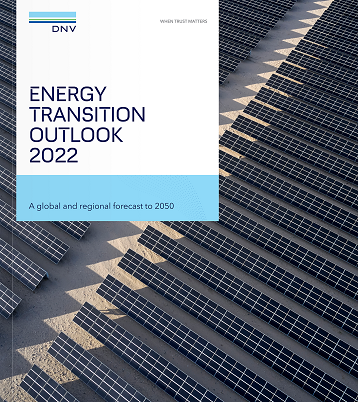Energy Transition Outlook: Energy crisis reinforcing two speed energy transition in short term
October 14, 2022
administrator
-
Heightened focus on energy security and rising prices reinforcing decarbonization difference between Europe and the rest of the world
-
Long term trends of the energy transition remain with rapid rise of renewables and growing electrification outweighing short term shocks
-
Growing and greening of electricity production remains the driving force of the transition, with renewables accounting for 83% of electricity production by 2050
-
One year on from UN Secretary General António Guterres’ Code Red warning on climate, emissions remain close to record highs putting world on course to warm 2.2°C by end of century

Høvik, Norway, 13 October 2022 – The heightened focus on energy security and the rising cost of energy is reinforcing the difference in decarbonization speed between Europe and the rest of the world – according to the sixth edition of DNV’s Energy Transition Outlook. Europe, which can be regarded as the leader of the energy transition, will double down on renewables and energy efficiency to increase its energy independence. European gas consumption will fall dramatically as a result of the war in Ukraine.
Compared to last year’s forecast, DNV sees the continent consuming almost half the amount of natural gas in 2050. Gas will meet just 10% of Europe’s energy demand in 2050 compared with 25% today.
Lower-income countries, where cost is the main driver of energy policy, are seeing a different trend. High energy and food prices are reversing the coal-to-gas switch and putting a dampener on decarbonization investments. For example, the share of gas in the Indian subcontinent’s energy mix will reduce from 11% to 7% in the next five years, while the share of coal will increase.
More broadly, inflationary pressures and supply chain disruption pose a short-term challenge to renewable growth. According to DNV’s Outlook, the global electric vehicle (EV) ‘milestone’ – when the EV share of new vehicle sales surpasses 50% – has been delayed by one year to 2033.
However, the impact of the current crisis on the overall energy transition is outweighed by the plunging costs of renewables and increased carbon costs in the longer term.
“The turbulence in the energy market does not dramatically alter the decarbonization pathway towards midcentury,” said Remi Eriksen, Group President and CEO of DNV. “The strongest engine of the global energy transition is the rapidly reducing costs of solar and wind energy, which will outweigh the present short-term shocks to the energy system.”
For the first time, DNV’s forecast sees non-fossil energy nudge slightly above 50% of the global energy mix by 2050. This is mainly because of the growing and greening of electricity production.
Electricity production will more than double and its share will grow from 19% to 36% of the global energy mix over the next 30 years. Solar PV and wind are already the cheapest form of electricity in most locations and by 2050 they will grow 20-fold and 10-fold respectively and will dominate electricity production with 38% and 31% shares, respectively. Renewables expenditure is expected to double over the next ten years to more than 1300 billion USD per year, and grid expenditure is likely to exceed 1000 billion USD per year in 2030. Energy security concerns are leading to renewed interest in nuclear, and the forecast this year reflects a modest uptick, growing by 13% from today’s levels to 2050. However, its share of the electricity mix will still reduce from 10% today to 5% by 2050.
The short-term increase of coal consumption will not prevent it from rapidly exiting the energy mix with its peak back in 2014. Oil has been approaching a plateau for some years and it will start to decline sharply from 2030 onwards. As a consequence of the war in Ukraine, global gas consumption will be lower than previously forecast. Before the war, DNV forecast natural gas would be the single largest energy source by the end of this decade, but this has been delayed to 2048.

Related Posts
YOUR GATEWAY TO THE NORWEGIAN EXPORT MARKET
Search Norway’s largest database of exporters:
• 35 business sectors
• 2000 product groups
• 8000 products & services
• Companies, trademarks, products or services

